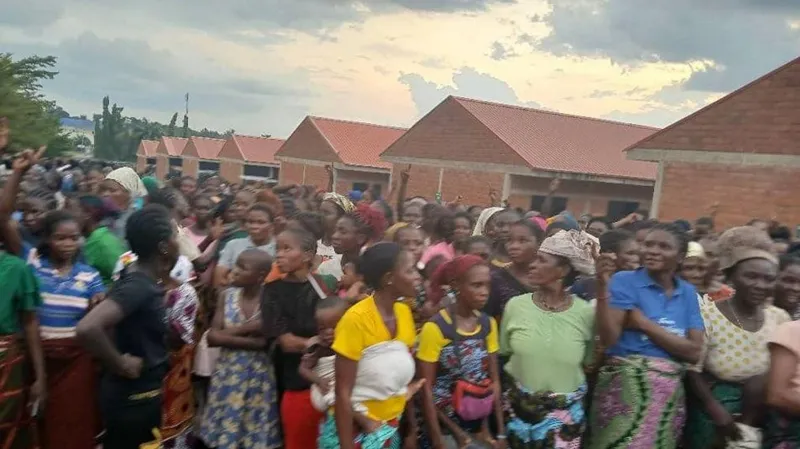Benue Bleeds Again: What’s Fueling the Unending Violence in Nigeria’s Heartland?
A fresh wave of bloodshed has once again gripped Benue State, rekindling long-standing fears over the deepening security crisis in Nigeria’s Middle Belt. In just a few days, more than 200 lives have reportedly been lost in a series of brutal attacks across various communities. With thousands displaced and protests erupting in the state capital, Makurdi, national attention is finally being drawn—though belatedly—back to a conflict that has festered for decades.
President Bola Ahmed Tinubu has directed security agencies to restore calm and bring the perpetrators to justice. Describing the killings as “inhuman and anti-progress,” Tinubu’s remarks follow increasing public outrage over what many see as government inaction.
READ MORE: ENOUGH OF THE BLOODSHED – NIGERIA MUST ACT NOW TO END THE KILLINGS IN BENUE STATE
But beyond the headlines, what exactly is fueling the violence in Benue—and why has it proven so difficult to end?
An Old Conflict, Now Escalating
The violence in Benue isn’t new. It is rooted in longstanding tensions between nomadic herders and sedentary farming communities. At the heart of the conflict is a fierce battle over land and resources—intensified by climate change, ethnic divisions, and religious differences.
According to security analyst Kabir Adamu, over 1,000 people were killed in Benue between May 2023 and May 2025, based on data from Beacon Security and Intelligence Limited. He warns that the scale and frequency of the killings have worsened, turning Benue into one of the country’s most dangerous hotspots.
The herders, predominantly of Fulani ethnic origin, migrate southward in search of grazing land for their cattle. In doing so, they frequently come into conflict with farming communities, who accuse them of destroying crops and polluting water sources. Some herders are armed—ostensibly to defend themselves from cattle rustlers—further complicating the fragile dynamic.
A Cycle of Blame, Retaliation, and Silence
While many local farmers blame Fulani herders for the attacks, Fulani leaders have pushed back, insisting their people are being wrongly accused. Baba Othman Ngelzarma, a prominent Fulani figure, told the BBC: “Our people are not behind the Benue killings… We have never allowed our people to attack or kill others.”
READ MORE: Israel Attacks Iran, Hits Nuclear Program In Unprecedented Strikes
Authorities have been reluctant to name culprits, but most observers agree the violence is reciprocal. Attacks often provoke revenge killings, creating a vicious cycle of retribution.
Underlying it all is a broader environmental and socio-economic crisis. Climate change has exacerbated desertification and irregular rainfall in northern Nigeria, pushing herders further south into regions like Benue, where land and water are already scarce.
“The competition for resources has become a trigger for conflict,” says Adamu. “Population growth and environmental stress are intensifying the situation, and without intervention, it will only get worse.”
Religion, Neglect, and the Politics of Security
Religion has added another layer of tension. While most Fulani herders are Muslim, the farming populations in Benue are predominantly Christian. Though not the root cause, these differences often become flashpoints, especially in politically charged narratives.
Public affairs analyst Sam Philip, based in Makurdi, believes the conflict has been overshadowed by other national security concerns like Boko Haram in the northeast, IPOB secessionist agitations in the southeast, and rampant kidnappings in the northwest.
“This crisis has not received the focused attention it deserves,” Philip argues. “That neglect is a big part of why it keeps escalating.”
Government Response: Still Too Little, Too Late?
Over the years, both state and federal governments have attempted to intervene, with limited success. A federal joint task force was launched in 2018, and more recently, a new Forest Guards initiative was introduced to flush out criminals hiding in remote areas. But the results have been underwhelming.
READ MORE: Lagos Govt to bring back monthly sanitation after 9yrs suspension
“Security presence must be sustained and intelligence-driven,” Adamu insists. He recommends deploying specialised tactical units to Benue, trained to adapt to evolving threats and capable of restoring long-term peace.
The Road to Resolution: Beyond Guns and Patrols
Experts agree that a purely military approach will not solve the problem. What’s needed is a blend of security, dialogue, and economic planning.
One controversial but potentially impactful proposal involves allocating dedicated grazing areas to pastoralists. The idea was floated during the Buhari administration but was largely rejected by southern states, who feared it would lead to land grabbing by Fulani groups.
Nevertheless, Adamu believes the concept could work if implemented fairly: “We must provide viable and sustainable alternatives for both herders and farmers. That’s the only way to break this cycle.”
Conclusion: A Nation at a Crossroads
Benue’s crisis is a mirror reflecting deeper national challenges—ethnic tension, environmental degradation, governance failure, and economic desperation. Until these root causes are addressed with sincerity and resolve, peace will remain elusive.
For now, the people of Benue continue to mourn, protest, and hope that the guns will one day fall silent.




